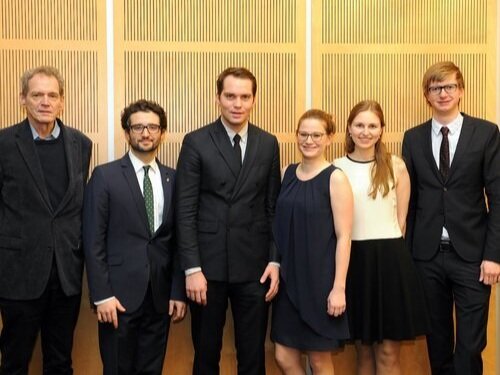Obermayer German Jewish History Award
Günter Boll
Steinenstadt, Baden-Württemberg
The work of Günter Boll has had a major impact in three countries. His research about the Jewish communities of Baden, Germany, Alsace, France and northern Switzerland has been of enormous value to Alsatian Jews and their descendants who currently reside in the far corners of the world. Because he shared his knowledge so willingly, family histories have been reconstructed and passed on to the next generation.
Günter Boll was born in Freiburg on August 5, 1940. Trained as a school teacher with a strong background in history, he developed a great interest in the Jewish communities that once flourished in the upper Rhine region. His serious, scholarly research began in earnest in 1981, when he succeeded in rescuing from a burning trash site many critical documents and objects that originally came from the Mackenheim synagogue, located in the Alsace region of France. These included 130 wimpels (ceremonial torah binders made from swaddling cloth used at the time of a brit milah) from the years 1669-1904, and vital records (birth, marriage, and death) going back to 1793.
This led to the publication of a significant book and to the exploration of grave inscriptions at a 400 year old cemetery, where until 1755 the Jews of Breisach were buried. His continued research allowed him to record the nearly obliterated words on many 18th-century tombstones, the most noteworthy of which was the gravestone of Josef Guenzburger, founder of six Jewish municipalities in Oberbaden. His findings led to the publication of dozens of studies about Jewish life. After more than twenty years of continuous effort, Mr. Boll persuaded the French government to declare the cemetery an official historic monument.
His focus was not simply historical or passive. He demonstrated through publication his passionate desire to share his knowledge with people living on both sides of the Rhine. He wanted them to know about the history and culture of a vanished world: the Jews of the countryside.
His intense interest in Jewish history has prompted him to give tours of the Jewish cemetery, the extermination camp of Natzweiler-Struthof and its satellite camp at Urbes. When Mr. Boll finally succeeded in saving the house of the last rabbi in Breisach, he initiated the construction of a center on that site to serve as a meeting place for Christians and Jews, in order to build positive new relationships that would encourage good will among people.
THIS WALL BRINGS PEOPLE TOGETHER
Students at this Berlin elementary school, built on the site of a synagogue, have been building a wall for the past two decades. It delivers a powerful message about community.
STUDENTS REACHING STUDENTS
When a handful of ninth graders from Berlin met Rolf Joseph in 2003, they were inspired by his harrowing tales of surviving the Holocaust. So inspired that they wrote a popular book about his life. Today the Joseph Group helps students educate each other on Jewish history.
“I SPEAK FOR THOSE WHO CANNOT SPEAK”
Margot Friedländer’s autobiography details her struggles as a Jew hiding in Berlin during World War II. Now 96, she speaks powerfully about the events that shaped her life and their relevance today.



